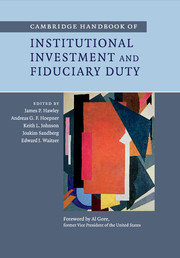Book contents
- Frontmatter
- Contents
- List of figures
- List of tables
- List of contributors
- Foreword
- 1 Introduction
- Part I Fiduciary duty: a global outlook
- 2 The public fiduciary: a Canadian perspective
- 3 The basis of fiduciary duty in investment in the United States
- 4 Governance and accountability in UK pension schemes
- 5 Institutional investment and fiduciary duty in Australia
- 6 The regulation of institutional investment in Sweden: a role model for the promotion of responsible investment?
- 7 The Dutch pension system
- Part II Fiduciary duty and the landscape of institutional investment
- Part III Challenging conventional wisdom on fiduciary duty
- Part IV Towards a broader interpretation of fiduciary duty
- Part V Beneficiaries’ roles and viewpoints
- Part VI Fiduciary duty and governance
- Index
- References
4 - Governance and accountability in UK pension schemes
Published online by Cambridge University Press: 05 April 2014
- Frontmatter
- Contents
- List of figures
- List of tables
- List of contributors
- Foreword
- 1 Introduction
- Part I Fiduciary duty: a global outlook
- 2 The public fiduciary: a Canadian perspective
- 3 The basis of fiduciary duty in investment in the United States
- 4 Governance and accountability in UK pension schemes
- 5 Institutional investment and fiduciary duty in Australia
- 6 The regulation of institutional investment in Sweden: a role model for the promotion of responsible investment?
- 7 The Dutch pension system
- Part II Fiduciary duty and the landscape of institutional investment
- Part III Challenging conventional wisdom on fiduciary duty
- Part IV Towards a broader interpretation of fiduciary duty
- Part V Beneficiaries’ roles and viewpoints
- Part VI Fiduciary duty and governance
- Index
- References
Summary
Introduction
Relatively little is known about the governance of UK pension schemes (Epstein 1992; Clark 2004; Evans et al. 2008) except that they are administered by trustees who have a duty to act in good faith on behalf of their members. Such an admission is surprising since pension schemes play an important role within the UK economy. For example, in 1993 the Pension Law Review Committee (PLRC) suggested that “[f]or most people, their pension rights are likely to be one of the most valuable assets they have” (Pension Law Review Committee 1993: 358). UK pension schemes are also large institutional investors in the capital markets (Solomon 2007) and so their success is important to many companies that rely on them for funding. However, in January 2009, The National Association of Pension Funds (NAPF) reported that the UK faced the prospective closure of nearly 50 percent of existing defined benefit (DB) schemes over the next five years (National Association of Pension Funds 2009). By February 2010, only 23 percent of all UK pension schemes remained open to new members compared to 88 percent ten years ago (National Association of Pension Funds 2010). In February 2012, the UK’s Pension Protection Fund (PPF) reported that the aggregate deficit of the 6,432 schemes in its PPF 7800 index was £222.2 billion and that 81 percent of these schemes were in deficit (Pension Protection Fund 2010).
- Type
- Chapter
- Information
- Publisher: Cambridge University PressPrint publication year: 2014



